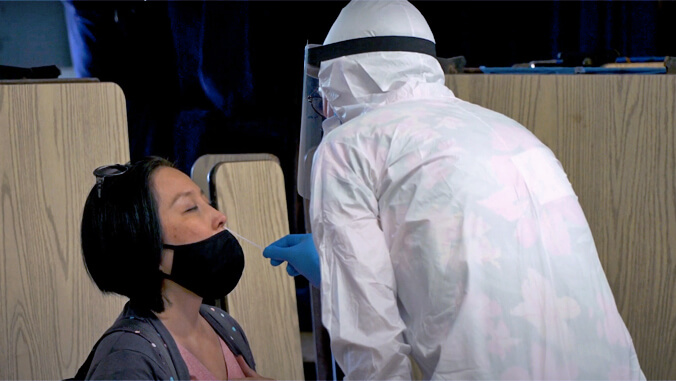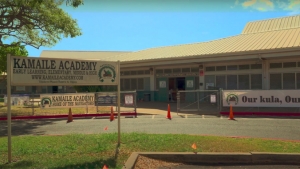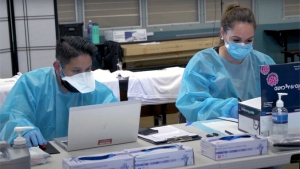
Despite Hawaiʻi’s progress in controlling the spread of COVID-19 infections and in administering vaccinations, significant gaps remain in the state’s underserved communities, further widening health disparities. But a Waiʻanae charter school’s success this spring as a pilot project for free weekly SARS-CoV-2 antigen testing of its teachers and staff could lead to safer school reopenings in the fall statewide.
Approximately 80% of the 120 teachers and staff at Kamaile Academy (K–12) volunteered to take free rapid antigen testing starting in March 2021. The pilot program concluded in late May, with the participating teachers and staff undergoing the nasal swab tests—many of them swabbing their own noses—and the majority being tested more than once, some on a weekly basis.
- About 87% of participants reported their participation led to a better understanding of the need for antigen testing
- 52% were more likely to be vaccinated as a result of the pilot testing and education program.
The Pacific Alliance Against COVID-19 (PAAC) project is a consortium effort of the University of Hawaiʻi at Mānoa’s John A. Burns School of Medicine (JABSOM), College of Social Sciences and College of Education, and the Accountable Healthcare Alliance of Rural Oʻahu. PAAC partnered with the Hawaiʻi State Department of Health and the Waiʻanae Coast Comprehensive Health Center for the pilot program at Kamaile Academy, a large charter school on Oʻahu serving a Native Hawaiian and Pacific Islander (NHPI) enriched community. PAAC is funded by the National Institutes of Health through a supplemental award to the Ola-HAWAIʻI grant led by JABSOM Dean Jerris Hedges.
“This pilot testing is invaluable as schools are poised to reopen this fall,” said Hedges. “It is wonderful to see this collaboration between physicians, educators and social scientists, and our PAAC interdisciplinary experts. They are all working together to keep our communities safe, especially those that have been hardest-hit by COVID-19.”
Native Hawaiian, Pacific Islander community

NHPIs rank among the highest ethnic groups disproportionately burdened by SARS-COV-2 in the U.S., which is compounded by long standing disparities in pre-existing conditions, subjecting those populations to a higher risk of COVID-19 mortality.
“The results of the pilot are excellent and truly reflect the rapport that the team built with Kamaile Academy participants,” said project co-lead Ruben Juarez, professor of economics and research fellow with the UH Economic Research Organization in the College of Social Sciences. “This is important given the disproportionate adverse impacts of COVID-19 on NHPI communities coupled with pervasive vaccine hesitancy.”
College of Social Sciences Dean Denise Eby Konan added, “We are so proud of this pilot project, whose primary goal is safer school reopenings, especially in underserved communities with higher health disparities. This multidisciplinary approach empowers UH to work with our health-focused partners, and recognizes how teachers and staff can be among the brightest warriors in the front-line fight against COVID-19.”
Community-based approach

PAAC believes that a community-based model can be developed for the safe and sustainable return of in-person K–12 classes statewide, and is inviting grade 6–12 teachers in Hawaiʻi public, private and charter schools to test its curriculum, provide feedback and receive a $25 gift card for participation. Interested teachers can also become COVID-19 certified educators and earn up to $200 after completing the modules and passing 10-question quizzes.
“This project re-envisions the professionalization of teachers as knowledge workers and partners in health research,” said Pauline Chinn, a professor in the College of Education’s Department of Curriculum Studies. “The central role of teachers and schools in the lives of children supports place-based, culturally sustaining teaching and learning. We just completed four videos that span the history of infectious diseases in Hawaiʻi to current news on variants, vaccines and testing. These videos and the Kamaile video may be viewed at www.paac.info.”
The PAAC team hopes to expand the pilot project this summer throughout the state (including schools on Molokaʻi and Hawaiʻi Island), via the Accountable Healthcare Alliance of Rural Oʻahu network of health centers, said project co-lead Alika Maunakea, a Native Hawaiian associate professor at JABSOM who was born and raised in Waiʻanae.
“These efforts highlight the resilience of our NHPI communities and showcase how health inequities can be eradicated when we draw on these strengths and rally together,” Maunakea said.
May Okihiro, associate professor of pediatrics at JABSOM and co-lead of the study added, “We have witnessed first-hand the impact of COVID-19 on Hawaiʻi’s rural and economically disadvantaged communities. Our community health centers and schools have risen to the challenge with a response that is amazing, creative and energetic.”
For more information, visit the PAAC website.
This work is an example of UH Mānoa’s goal of Excellence in Research: Advancing the Research and Creative Work Enterprise (PDF), one of four goals identified in the 2015–25 Strategic Plan (PDF), updated in December 2020.

